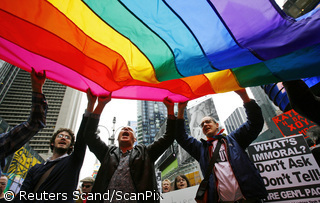Poland and Russia on Saturday mourned thousands of people massacred by the Soviet NKVD secret police during World War Two.
Published:
4 September 2000 y., Monday
Poland and Russia on Saturday mourned thousands of people massacred by the Soviet NKVD secret police during World War Two and vowed to strengthen the often strained relations between the two neighbors.
Polish Premier Jerzy Buzek and Russian Interior Minister Vladimir Rushailo dedicated a cemetery marking the mass grave of some 6,000 Poles shot in pine forests outside the Russian town of Mednoye, 200 km (125 miles) northwest of Moscow.
It is one of several mass graves in Russia and Ukraine that hold the bodies of some 22,000 well-educated Poles, including reserve officers, border guards, policemen and civil servants who the Soviets feared would oppose their control of Poland.
Soviet troops invaded Poland in September 1939 under a secret pact with Nazi Germany to divide Eastern Europe. The Germans broke the pact in 1941 when they invaded the Soviet Union and the territories it had occupied.
In 1943, German troops advancing eastward found the bodies of some 4,000 Polish army officers in a mass grave in Katyn and accused Soviet troops of killing them.
The Soviet Union maintained for decades that the Nazis had killed the men during their occupation of the area, admitting responsibility only in the final days of Mikhail Gorbachev's perestroika period. During World War Two, Poland's underground government also searched for officers who disappeared from prisoner of war camps near other towns, including Tver in Russia, from where prisoners were taken to the forest outside Mednoye. The bodies of about 7,000 Poles have never been found.
Šaltinis:
Central Europe Online
Copying, publishing, announcing any information from the News.lt portal without written permission of News.lt editorial office is prohibited.
The most popular articles
 Tiwonge Chimbalanga and Steven Monjeza are married, but in Malawi homosexuality is banned.
more »
Tiwonge Chimbalanga and Steven Monjeza are married, but in Malawi homosexuality is banned.
more »
 The World Bank today launched the fourth book in the critically acclaimed Moving Out of Poverty series, which provides bottom up perspectives on poverty and local realities by over 60,000 people living in 500 communities in 15 countries.
more »
The World Bank today launched the fourth book in the critically acclaimed Moving Out of Poverty series, which provides bottom up perspectives on poverty and local realities by over 60,000 people living in 500 communities in 15 countries.
more »
 Ten years ago, European leaders pledged to end poverty in the EU by 2010. As this deadline approaches, the goal is still some way off.
more »
Ten years ago, European leaders pledged to end poverty in the EU by 2010. As this deadline approaches, the goal is still some way off.
more »
 For many 2009 will be a historic year with the coming into force of the Lisbon Treaty, the outcome of the Copenhagen summit and the inauguration of the first black US president.
more »
For many 2009 will be a historic year with the coming into force of the Lisbon Treaty, the outcome of the Copenhagen summit and the inauguration of the first black US president.
more »
 Not answering the phone, celebrating Hogmanay and reading Dickens' Christmas Carol are just three seasonal traditions that MEPs shared with us.
more »
Not answering the phone, celebrating Hogmanay and reading Dickens' Christmas Carol are just three seasonal traditions that MEPs shared with us.
more »
 More and more people make their homes and own property in EU countries other than the one in which they hold citizenship.
more »
More and more people make their homes and own property in EU countries other than the one in which they hold citizenship.
more »
 European Parliament President Jerzy Buzek has made an televised Christmas and New Year address to European citizens, looking ahead to the challenges of the coming year.
more »
European Parliament President Jerzy Buzek has made an televised Christmas and New Year address to European citizens, looking ahead to the challenges of the coming year.
more »
 Lithuania takes the 1st position in the EU by the number of students in the country.
more »
Lithuania takes the 1st position in the EU by the number of students in the country.
more »
 Sergei Kovalev, former political prisoner turned activist for Russian human rights group Memorial gave an emotional and heartfelt address to the European Parliament on Wednesday 16 December.
more »
Sergei Kovalev, former political prisoner turned activist for Russian human rights group Memorial gave an emotional and heartfelt address to the European Parliament on Wednesday 16 December.
more »
 Strengthened passenger rights for travel by bus are an important item on the agenda when the Transport, Telecommunications and Energy Council (TTE) meets on 17–18 December.
more »
Strengthened passenger rights for travel by bus are an important item on the agenda when the Transport, Telecommunications and Energy Council (TTE) meets on 17–18 December.
more »